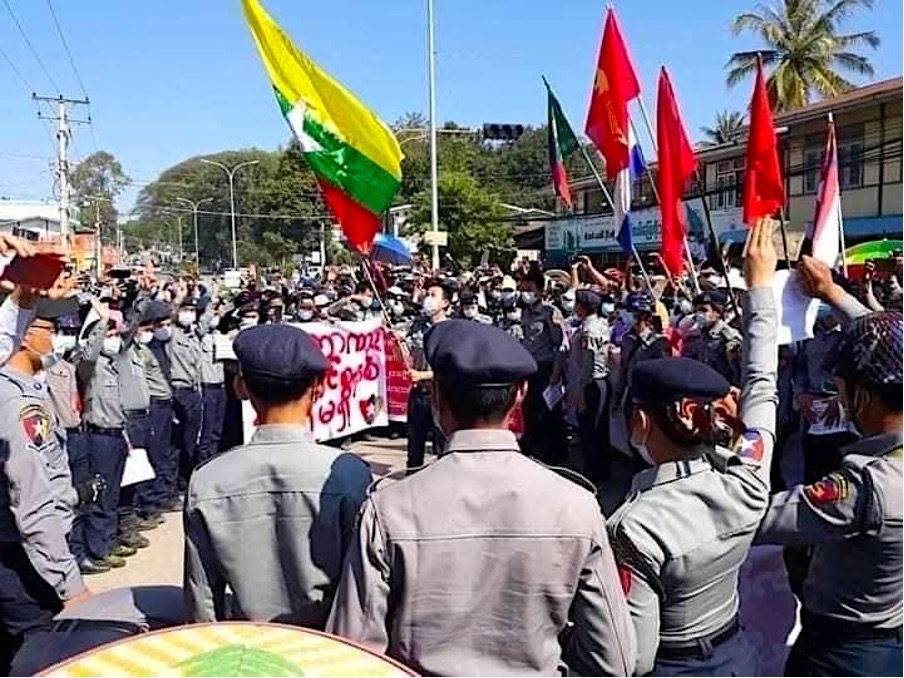29th August 2021
As the conflict settles down into a regular pattern of civil disobedience and sporadic violence with frequent clashes between the military and the informal armies, things are stirring in the background.
The army is showing signs of splitting. It’s not enough to cause a major problem for the Tatmadaw but is sufficient to be irritating. Whilst it is mostly confined to enlisted men and NCOs, it is starting to spread through the officer corps up to Major level. There are whisperings that one or two generals are unhappy with the course of events, but it is difficult to substantiate this. If that is true and the rumblings of discontent spread then the military is in trouble. It can only be defeated from within or by overwhelming forces in an invasion, and that isn’t going to happen.
Currently around 2,000 soldiers and police have defected, joining the CDM, with many more plucking up the courage to join them. This is a higher rate of defection than happened during the 1962 uprising and the 1988 protests.
What is also different from previous coups is that the soldiers now have access to social media and are realising the scale of the corruption of the senior military and can’t reconcile that with the brutality that they are being asked to use to maintain the corrupt lifestyle of the generals. They are also noticing that the rank and file are being unfairly treated as those with family connections to the elite are handed less dangerous postings to the capital Nay Pyi Taw. The casualty rate is hitting home, with even postings to Yangon exposing them to guerrilla action.
In an interesting development in Kayah State, the rebels are taking action.

Striking police officers in Kayah State have formed a police force which will work together with anti-regime groups to fight military rule. It is the first such shadow police force to be formed in Myanmar since the junta’s February 1 coup.
The Karenni State Police (KSP) was formed on August 15 under the leadership of the Karenni State Consultative Council (KSCC).
It consists of 320 police who defected from the junta-controlled Home Affairs Ministry after the coup. Most are from Kayah State and Pekon Township in southern Shan State, but a few are police from central Myanmar who have taken refuge in Kayah in southeastern Myanmar.

“We will contribute what we can during the revolution. We will provide security when we can occupy areas. We will provide help for displaced people. We will act in line with human rights if we catch prisoners of war. We are trying our best to serve the Karenni people,” said U Ne Ye Zin, the information officer for the KSP.
The KSCC was formed in April and comprises elected lawmakers and representatives of political parties, ethnic armed organizations and civil society groups, including the long-standing Karenni National Progressive Party (KNPP).
The council is intended to act as a parallel administration to the military regime and to run the administrative, legislative and judicial mechanisms in Kayah. The KSCC is in the process of negotiating with the shadow National Unity Government for cooperation and collaboration in fighting the junta.
The KSP will act as a law enforcement organization under the KSCC to provide security for the people and protect public interests in seven townships across Kayah State, as well as Pekon, where there is a high ethnic Karenni population, said the KSCC announcement.
Police majors are the highest rank to have deserted the Home Affairs Ministry to join the KSP.
Source The Irrawaddy 27th August 2021.
In further developments, 12 Peoples’ Defence Forces (PDF) have been organised as an allied defence group.

This is the first cross-region organised group since the coup. It has serious implications for the Junta as more and more of the EAOs and ad hoc defence groups start to communicate with each other and can start to plan coordinated action.
Please share this article so that others can discover The BFD

